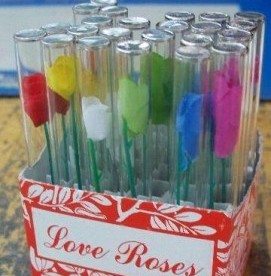The Crack Tax

Crack — a smokeable form of cocaine which is all too common — is highly addictive and very dangerous. At $50 to $100 per gram on the street (that’s a Google-fueled guess by the way; sorry if I have that wrong, but I’ve never been in the market for crack), it’s also a lower-cost alternative to those cocaine addicts who need a hit but don’t have the dollars for the straight, snort-able kind. Oh, and in most places, it’s illegal — including in the United States, which includes the state of Tennessee.
So, let’s say that it was the year 2006, and you were a drug dealer. And, just to make the story work nicely, let’s say you were in Tennessee, where we’ve already established that your crack dealing put you on the wrong side of the law. Tennessee, at the time, wanted you to stop dealing drugs, of course, but the state had a creative little weapon at its disposal: by law, you had to tell a state agency if you about your illicit activity.
And if you did, they’d give you a little stamp.
But if you didn’t? When the law finally caught up with you, they’d the state would take your money and tack on some jail time, too.
How? By adding a charge of tax evasion to your rap sheet.
Tennessee’s unique requirement, commonly known as the “crack tax,” was actually called the “Unauthorized Substances Act” and applied to all sorts of illegal drugs (and moonshine, too). In short, if you wanted to sell crack and the like in Tennessee, you had to first pay a tax on it. (Selling crack, even if you paid the tax, was still illegal.) The summary of the law was on the State Department of Revenue’s website at the time, but for reasons soon to be explained, is now gone. Thankfully, due to the magic of the Internet, it’s been archived for posterities sake. But just in case, here’s the relevant language:
The Unauthorized Substances Tax applies to controlled substances and certain illicit alcoholic beverages. This tax is due by any merchant or peddler who possesses an unauthorized substance upon which the tax has not been paid. Merchants or peddlers may purchase stamps from the Department of Revenue and affix them to the substance as proof that tax has been paid.
That seems like an awful, awful idea if you’re a drug dealer, right? You’d be arrested on the spot, right? Maybe not. The Department of Revenue promised that the purchase of stamps could be done anonymously and, in any event, “any information obtained pursuant to the unauthorized substances tax law is strictly confidential and may not be disclosed or used in a criminal prosecution other than a prosecution for a violation of the unauthorized substances tax law.” In short: paying the tax couldn’t lead to a drug dealer’s arrest, but non-payment could add time to his or her prison sentence.
In practice, that’s actually what happened. If a drug dealer was caught with unstamped drugs, they’d be arrested for possessing the illegal goods (which would in turn be confiscated), and then they’d get a bill for unpaid taxes which, if unpaid, could mean more time in the lockup. To a degree, the tax worked. According to the Memphis Daily News (scroll down if you click), the state managed to collect $1.8 million via the tax — perhaps some via stamp purchases — in 2006 alone. Not bad.
But alas, the law is long gone. In 2007, a three-judge panel unanimously ruled that the law ran afoul of the state constitution — the state, the court decided, can’t declare something illegal and also tax it. So if you’re a crack dealer in Tennessee, don’t worry about it. Well, don’t worry about the tax part, at least — selling crack is still illegal.
Bonus Fact: Go to a convenience mart at a gas station and you may see some paper roses for sale, and for about $2 a piece. (Something that looks like this.) You may wonder who could possibly want a $2 paper rose, and the answer is pretty close to nobody. But, as the Washington Post reported, the container may be worth that much — “the real attraction,” noted the Post, “is the four-inch-long tube that holds the flower.” Why? The tube is made of glass and therefore has a secondary purpose: law enforcement officials told the Post that “it’s a thinly disguised crack pipe.”
From the Archives: The War Against Pyrex: How the crack cocaine biz made measuring cups less resilient.
Take the Quiz: Where is cocaine use most common? (As of 2009.)
Related: You can buy crack pipe roses on Amazon, in bulk, for about $0.30 each. That’s surprising, to say the least. Crack pipe repurposing is exactly what’s going on there, too. If you click that link, you’ll note that the “love roses” and another product called “Chore Boy” (a type of scouring pad) are “frequently bought together.” (Just in case, I took a screen shot, here.) Chore Boy, Wikipedia notes, “has garnered a rather large market as a makeshift component in do-it-yourself crack cocaine pipes.”
